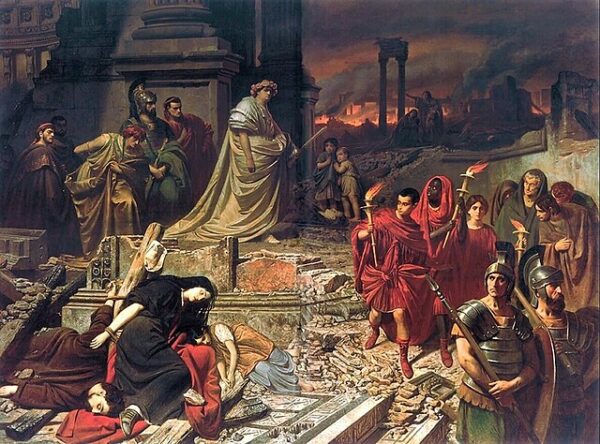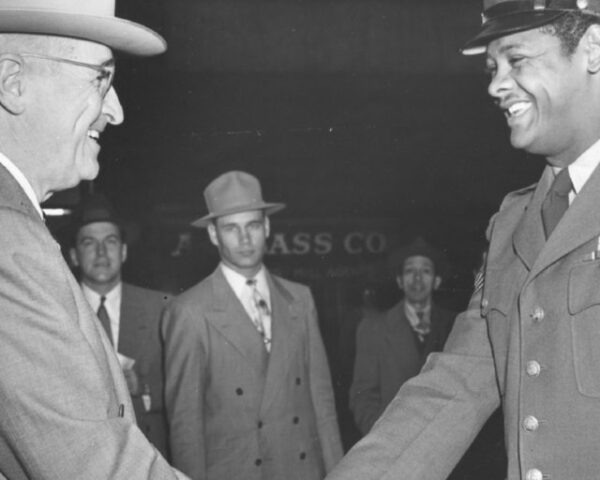On July 19, 64, the inhabitants of the Eternal City found themselves caught in an inferno. The fire allegedly started sometime in the middle of the previous night in the bustling commercial district near the Circus Maximus and quickly spread due to strong winds and narrow streets packed with wooden buildings.
The fire rapidly spread through the city, consuming homes, shops, and public buildings. The dense urban environment fueled the flames, and the lack of an organized firefighting force worsened the situation. Despite the efforts of the citizens and the imperial guard, the fire could not be contained.
“The flames raged for six days before coming under control; then the fire reignited and burned for another three. When the smoke cleared, 10 of Rome’s 14 districts were in ruin. The 800-year-old Temple of Jupiter Stator and the Atrium Vestae, the hearth of the Vestal Virgins, were gone. Two thirds of Rome had been destroyed, according to PBS.
History has blamed Nero for the disaster, implying that he started the fire so that he could bypass the senate and rebuild Rome to his liking. Much of what is known about the great fire of Rome comes from the aristocrat and historian Tacitus, who claimed that Nero watched Rome burn while merrily playing his fiddle. Gangs of thugs prevented citizens from fighting the fire with threats of torture, Tacitus wrote. There is some support for the theory that Nero leveled the city on purpose: the Domus Aurea, Nero’s majestic series of villas and pavilions set upon a landscaped park and a man-made lake, was built in the wake of the fire.
“It would have been seen as very inappropriate on the part of the elite in Rome,” says art historian Eric Varner. “They would have been happy if Nero had built the Domus Aurea out in the country, but to do it here in the city really was an extraordinary kind of statement.”
Following the Great Fire of Rome, Emperor Nero faced significant backlash and suspicion regarding his role in the fire’s outbreak. To defelct the blame, Nero targeted a new and growing religion: Christianity. Leaders in Rome already viewed the early Christian community with suspicion. Nero saw an opportunity to shift public opinion and scapegoat the Christians as the cause of the disaster.
The persecution of Christians under Nero was brutal and relentless. Christians were arrested, imprisoned, and subjected to various forms of torture and execution, often as a form of entertainment for the public. They were accused of starting the fire and labeled as enemies of the state. Many were crucified, burned alive, or torn apart by wild animals in the Roman arenas. Nero’s persecution of Christians was not limited to Rome but extended throughout the Roman Empire, leading to widespread fear and suffering among Christian communities.
One of the victims of Nero’s brutality was the Bishop of Rome: Saint Peter. Allegedly personally targeted by the emperor, Peter requested to be crucified upside down, as he felt unworthy to die in the same manner as Christ.
Despite the persecution, Christianity continued to spread, and the faith of the early Christians remained steadfast. The persecution under Nero marked the beginning of a long and tumultuous history of Christian persecution in the Roman Empire. The events surrounding the Great Fire of Rome and the subsequent persecution impacted the early Christian community in profound ways, shaping its identity and resilience in the face of adversity.
The aftermath of the Great Fire of Rome had profound consequences. Nero, who was away from the city at the time, returned and took immediate action to provide relief to the victims. He opened up his own gardens to house the displaced and funded the reconstruction efforts. However, rumors of his involvement in starting the fire persisted, leading to a scapegoating of the early Christian community in Rome. This event marked the beginning of a period of intense persecution of Christians throughout the Roman Empire.






